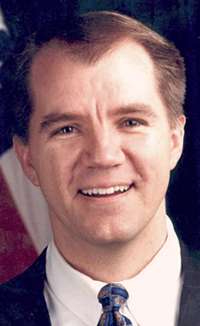Trump Eyes Libertarian-Minded Texas Judge for Federal Court Vacancy
The Trump administration has two openings to fill on the U.S. Court of Appeals for the 5th Circuit.
There are currently two vacancies on the New Orleans-based U.S. Court of Appeals for the 5th Circuit, the federal appellate court whose jurisdiction covers federal districts in Louisiana, Mississippi, and Texas. According to a recent report published in Legal Times, the Trump administration is moving quickly to fill those vacancies and is now considering a shortlist of six candidates for the two jobs. What names are on the list? Here's Legal Times:
According to four people who are familiar with the process but who declined to be named, the candidates being considered include: Texas Supreme Court Justice Don Willett; U.S. District Court Judge Reed O'Connor of Fort Worth; former Texas solicitor general James Ho; Andy Oldham, a deputy general counsel to Gov. Greg Abbott; Michael Massengale, a justice on Houston's First Court of Appeals, and Brett Busby, a justice on Houston's Fourteenth Court of Appeals.
Two names on this list jump right out at me.

The first is Texas Supreme Court Justice Don Willett, a rising star in conservative and libertarian legal circles who also appeared on Trump's recent list of potential U.S. Supreme Court nominees.
Willett is best-known for his concurring opinion in the 2015 case of Patel v. Texas Department of Licensing and Regulation. At issue was whether state officials had a legitimate health or safety reason to require eyebrow threaders to obtain an occupational license before they could lawfully charge customers for the act of threading a piece of cotton string through their eyebrows in order to remove old hair and skin. The Texas Supreme Court laughed away the state's ostensible justifications and struck down the regulation.
Willett joined the majority opinion but also wrote separately in order to emphasize the broader issues at stake. His 49-page concurrence is effectively a call to judicial arms in defense of economic liberty. "This case is fundamentally about the American Dream and the unalienable human right to pursue happiness without curtsying to government on bended knee," he wrote. "It is about whether government can connive with rent-seeking factions to ration liberty unrestrained, and whether judges must submissively uphold even the most risible encroachments." I should also note that Willett's Patel opinion favorably cited my book Overruled: The Long War for Control of the U.S. Supreme Court.
If successfully appointed to the 5th Circuit, Willett would immediately rank as one of the most libertarian-minded federal judges in the country.
The second name on the 5th Circuit shortlist that jumps out at me is former Texas solicitor general James Ho. A former clerk to Justice Clarence Thomas, Ho is perhaps best known in legal circles for a 2006 law review article defending the constitutionality of birthright citizenship for the U.S.-born children of undocumented immigrant parents. "Birthright citizenship is guaranteed by the Fourteenth Amendment," Ho wrote. "That birthright is protected no less for children of undocumented persons than for descendants of Mayflower passengers."
Notably, Ho's position here is directly at odds with the stated views of Donald Trump. In an August 2015 immigration white paper, for example, presidential candidate Trump vowed to "end birthright citizenship," calling it the "biggest magnet for illegal immigration." In an interview with Fox News host Bill O'Reilly, Trump said, "I don't think they have American citizenship," referring to the U.S.-born children of undocumented parents. "It's not going to hold up in court, it's going to have to be tested."
Here's an amusing thought experiment: Trump tries to test his theory of birthright citizenship in the 5th Circuit and ends up in the courtroom of Trump-appointee Judge James Ho. How does Trump respond after Judge Ho rules decisively against him?


Show Comments (25)